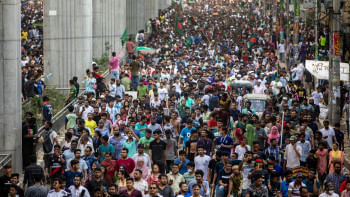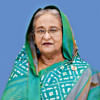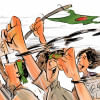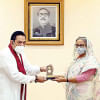How to not fall for another dictator

The quick-fire collapse of Sheikh Hasina's Awami League dictatorial regime seemed unbelievable till it happened on August 5, 2024. The historic fall of the longest serving female head of state in the world mirrors the Arab Spring in the Middle East, which began in 2010 when anti-authoritarian uprisings toppled one notorious dictator after another in the region. Before her resignation, Bangladesh's former Prime Minister's response to the student quota reform movement with crushing lethality that killed at least 450 people, had begun resembling the obsessive autocratic tendencies and brutal methods of ousted Arab leaders such as Tunisia's Ben Ali, Egypt's Hosni Mubarak, and Libya's Muammar Gaddafi—to name a few.
The "one-point" step down slogan—Ek Dafa, Ek Dabi—reverberating in the nationwide protests on Saturday, August 3, was reminiscent of the slogan of the Arab Spring, "The people want to bring down the regime," as were the images of hope and euphoria of mass gatherings of people from all walks of life striving for democratic change. But beyond the optics, the most significant parallel between Bangladesh's historic movement and the Arab Spring is their driving force: pent-up frustration and socio-economic grievances of the mass people, the youth, the middle and lower class, towards grave inequality and injustice fostered by corrupt, fear-mongering dictatorships.
Though the Arab Spring led to the fall of seemingly invincible leaders—like Sheikh Hasina seemed a week ago—the victory was short-lived in most countries, as the downfall of the reviled regimes instead led to further turmoil. Only Tunisia, came out of the revolution as a success story and began backsliding last year. Libya and Syria collapsed into civil war, and foreign powers' heavy investment in Yemen's democratic transition led the country to a disastrous civil war. Egypt, on the other hand, witnessed a military coup followed by the rise of a leader even worse than the one they got rid of. Understanding the underlying reasons for the failure of the nations' to transition to democratic regimes is crucial as Bangladesh navigates uncharted waters of a seismic regime change, unlike any before.
The incoming interim government should serve longer than previous ones in Bangladesh's history, in order to strategically start rebuilding the nation before groups with vested interests hijack the political vacuum.
In a podcast with Jacobin magazine, writer Anand Gopal attributed the Arab Spring's failure to neoliberal economic policies which were not challenged after the oppressive governments were toppled. "Because the poor and working class didn't have the structural leverage to organise collectively and as a class, they instead conceived of them differently—say, as Muslims against the more elite figures who don't represent Islam. That's where fundamental Islamists came in," explained Gopal. The role of the political economy cannot be understated for a constructive change in the system of governance in Bangladesh.
The disparity between long standing elites in Bangladesh—many of whom silently adhered to Sheikh Hasina's regime for their own gains—and the working class or unemployed—who were denied basic economic and human rights—need to be addressed as we shift towards a system where an all-powerful regime is never again allowed to reign with terror and impunity. There is anger, there is hate—and that was always going to be the case. The fragmented society has to establish a unified dialogue to solve it. After Tunisia's Ben Ali fled, he too, left behind a nation in chaos. Vandalism, looting and rioting went on for five days. The nation witnessed unrest till the next Prime Minister, Mohamed Ghannouchi, reshuffled the cabinet. Democracy as an umbrella idea for "free speech" and "free and fair elections," without addressing deeply unequal systems—which is what triggered Hasina's fall—will lead us down the same path as the Arab nations that went backwards despite a world-changing moment.
Since Sheikh Hasina fled, attacks on Hindu minorities have escalated, and vandalism, looting, burning and violence has engulfed the nation. Bangladesh is predominantly a secular country, and its very strength lies in that fact. The student coordinators have insofar stepped into protecting minorities, and minority places of worship. To retain and expand unity of all communities in Bangladesh, the interim government and the Bangladeshi community as a whole, have to work towards changing the existing social contracts which disproportionately affect marginalised people of all religions. During Egypt's uprisings against three-decade ruler Mubarak, minority Orthodox Coptic Christians thought the discrimination would end after the revolution, but it escalated instead. Five years later, as current President Abdel Fattah El-Sisi took office overthrowing an Islamist regime, the violence and divisions between Muslims and Christians have continued to intensify, along with socioeconomic disparity.
A burst of democratic spirit and national unity, similar to what we witnessed last week, brought down the oppressive regimes of the Arab countries a decade ago, but the movements lacked structure or plans for the future. When such a formidable dictatorship like Awami League falls, there's a blitzkrieg of non-violent actions needed to create a new form of governance from scratch. In that regard, the students' dialogue with the army, and the appointment of Dr Yunus as Chief Advisor, aligned with the students' requests, is a start. But due to the fact that the Awami League regime denied citizens free elections, and a breeding ground for new political parties to emerge, the interim government will have to stay intact for longer than previous ones, in order to start rebuilding the cracked pillars of the country before groups with vested interests take advantage of the political vacuum.
Egypt's swift return to autocracy, after ousting Mubarak, is a cautionary tale for Bangladesh. In 2012, Egypt elected Islamist Mohammed Morsi, with fierce opposition from the protesters who ousted Mubarak—paving the way for a military coup by then Defence Minister Abdel Fattah-Al Sisi, whose dictatorial regime is more autocratic and harmful to Egypt's middle and lower class, than Mubarak's was. The economic woes which drove people to protest and demand for social justice, dignity and democracy, in the streets of Cairo in 2011, continue to persist today.
For all but 12 years since 1971, the political landscape of Bangladesh has always been caught in a tussle between BNP—the political dynasty of former president Ziaur Rahman—and Awami League—the political dynasty of the Father of the Nation—Sheikh Mujibur Rahman. Recently, BNP General Secretary Mirza Fakhrul Islam has announced that Tarek Rahman, the son of former Prime Minister Khaleda Zia will return to Bangladesh soon from exile in the United Kingdom. Students coordinators have voiced that they want a change in the overall system of Bangladesh, in which fascism, authoritarianism, or "any leader like Sheikh Hasina" can never emerge again. Tarek Rahman's ascendancy to politics was based on nepotism—which the quota reform movement sought to fight. His political career has long been under a cloud; though he denies certain charges, a leaked US embassy cable from 2008 called him a "notorious and widely feared… symbol of kleptocratic government," who had "flagrantly" demanded bribes in return for procurement decisions and political appointments. The prospect of BNP or other existing parties returning with the same political dynamics will inarguably perpetuate the same cycle of corruption and mass sufferings.
Breaking free of authoritarianism is a long, difficult road. In 15 years, the Awami League has ruled the country with a fortress of fear, normalising inequality of the classes, thuggery of those in power, wealth appropriation by government authorities, corruption within the elites and government officials, cronyism and lawlessness in every corner of the society. While we could not write any of this before, it must be said now that the legal system was also robbed of its independence. The student wing of Awami League, BCL, which has long terrorised the youth and dissenters with brute force, have also been left behind; the brainwashing of violent ideologies too, needs to be addressed constructively.
Tunisia, which was long known to be the only success story coming out of the Arab Spring—holding two democratic free and fair elections in 2014 and 2019–is now facing the exact issues they fought against in 2011. The civil society in Tunisia won the Nobel Peace Prize in 2015, for mediating the National Dialogue in 2013. Yet its drive for consensus to keep both labour and business parties content without concrete steps to address the economic issues since 2011 led to a stagnating economy, affecting the youth, causing widespread disillusionment and polarisation. The current populist President Kais Saed, as such, has been cracking down on dissenters and, according to critics, suppressing challengers ahead of October elections after the Tunisia court jailed potential presidential candidates on August 5. Tunisia's unfortunate relapse only affirms that sustained recovery from autocratic governments requires far more innovation and a renewed effort to connect political citizenship with socioeconomic rights.
Change never happens overnight, but positive change warrants learning from other nations, like the Arab states. Despite leading a once-in-a-generation revolution in this century, the Arab citizens continue to live through the same unbearable oppressive system—uprisings have been rocking the region since 2018. Marwan Muasher, a former Jordanian diplomat who authored The Second Arab Awakening, told the Middle East Eye, "Arab Spring 1.0 could have resulted in social peace if Arab governments understood the need for new social contracts and the need for more open political systems, and the need to fight corruption institutionally."
Ramisa Rob is in-charge of Geopolitical Insights at The Daily Star.
We welcome your contributions and analysis of global events. To submit articles to our weekly page, Geopolitical Insights, please send an email to [email protected]
Follow The Daily Star Opinion on Facebook for the latest opinions, commentaries and analyses by experts and professionals. To contribute your article or letter to The Daily Star Opinion, see our guidelines for submission.

 For all latest news, follow The Daily Star's Google News channel.
For all latest news, follow The Daily Star's Google News channel. 










Comments